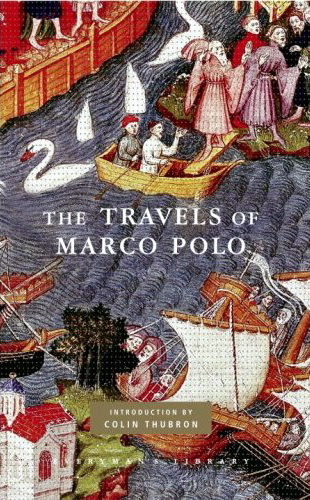The Travels of Marco Polo-Peter Harris Edition Book Review
Shocking glimpses of medieval Asian culture
…that may also unlock Khmer mysteries
Review by Kent Davis – Purchase this book on Amazon.comThe Travels of Marco Polo-Peter Harris Edition Book Review
“Few texts have aroused more controversy than the book of Marco Polo,” notes editor Peter Harris with good reason: the Asian tales that Marco Polo brought back to Renaissance Europe were absolutely unbelievable! But, as this carefully crafted new edition reveals, the astounding truth is that most of Polo’s account turns out to be quite accurate.
Like many “Great Works” this is a famous title that most people (myself included) have heard of throughout their lives…but have never read. One lazy Sunday I drifted into watching a Marco Polo dramatization on TV. It annoyed me a bit, as it seemed to be a rather silly, romanticized, sensationalized Hollywood treatment…but I watched it to the end. And then went to Amazon to find a book to get the real facts.
Amazing news: The “sensationalized” mini-series barely scratched the surface of the astounding facts Marco Polo reports in his actual book!
How does Marco Polo’s book relate to understanding more of the Khmer civilization?
In three very relevant ways:
1. Marco Polo (1,254-1,324 AD) was a contemporary of Zhou Daguan (1,266-1,346 AD), the Chinese traveler who created the most detailed account of life in early Cambodia.
2. Marco Polo traveled the regions surrounding Cambodia, giving precise accounts of government systems, technology, social customs, trade goods and many other features of day to day life. All these help us form a more detailed picture of life in Cambodia at the time of the Khmer Empire.
3. Editor Peter Harris makes this new edition of Polo’s fantastic voyage especially accessible, substantiating his account with considerable new analysis. Harris is a Sino-linguist, whose unique ability to consult original Chinese texts brings a new level of understanding to this work. Equally important, Harris also recently completed a new translation of Zhou Daguan’s 13th century work, A Record of Cambodia: The Land and Its People.
Back to the story itself, Polo was a merchant with the heart of an anthropologist. Accounts of terrain, natural resources, buildings and trade goods abound (and can be quite dry) but these are punctuated by his unusual observations of ethnicities, religions, social customs and royal intrigues.
Indeed, Marco Polo’s home was less civilized than the society he witnessed in China, to the point that he often had no point of comparison. Yet, he conscientiously describes city planning, landscaping, shopping malls, hospitals, public welfare systems with job retraining, organized law enforcement, paper money, military technology and systems of management, homes with central coal heat, multi-lingual government agencies, fire departments, long distance messenger networks, paved roads, public and private parks, and much more.
And, perhaps explaining the book’s centuries of commercial success, there are plenty of tales of cannibalism, polygamy, polyandry, cults of assassins, sexual behavior, dowry customs, human sacrifice, executions, funerary customs, prostitution, gambling, sport, magic ritual, strange beasts (rhinoceroses, elephants, leopards, crocodiles, serpents, the mythical Roc bird), etc.
One comes away from this book in awe of medieval life in China, and with great respect for this brave man who did an admirable job capturing the infinite diversity of 13th century Asian life. His words also inspire a vision of the high Khmer civilization that left us architectural marvels including Angkor Wat.
Read this account and share all the adventures of Marco Polo’s amazing journey.

